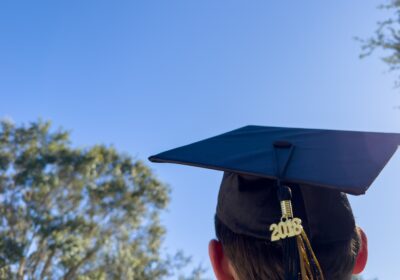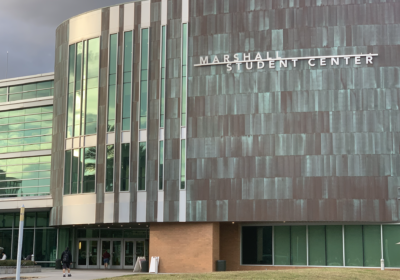Dubai win opens possible doors for student body president
Education Without Borders (EWB) reviewed 3,700 applicants from 140 countries, representing 300 different universities, and chose eight winners, including USF’s own Student Government (SG) student body President Cesar Hernandez.
EWB, a biennial international student conference geared toward cross-cultural networking, invited 700 students to attend an awards event in Dubai, United Arab Emirates (UAE). Of those, 36 finalists were judged on presentations given during the conference, which was held March 28-31 under the patronage of Sheikh Khalifa bin Zayed Al Nahyan, the president of UAE.
EWB is organized by Higher Colleges of Technology, the largest institution of higher education in UAE.
Hernandez said his victory in the competition instantly attracted attention to him.
“It was so surreal because afterwards all these people come up to you and (are) wanting to give you their business cards,” he said. “And it was just so much happening at one point, and now I have to go back and catch up with people.”
A United World Colleges representative offered him a scholarship to attend the school, though Hernandez said he is unsure whether the program aligns with he wants to do.
“Now I’m getting emails to go present in Singapore, Australia, Zurich and this leadership conference in Pittsburgh,” he said. “It would be good because when I go to present at these conferences, USF goes with me.”
For placing in the top 36, Hernandez got a scholarship covering his expenses for the trip and was also given a ThinkPad, he said.
All 36 finalists were divided into five sub-theme categories: education, economics, science, new media and policy. Hernandez competed against presentations from seven other finalists in the policy sub-theme.
The policy award was presented to Hernandez by the Shiekh.
Hernandez said he discussed two major points in his presentation: immigration in the U.S. and the millennial generation.
“The millennial generation is the generation we’re in right now,” he said. “We need to invest in it.”
The millennial generation will be the largest generational voting block by 2017, Hernandez said. They will inherit a debt of about $10 trillion.
“What are we going to do with that? What exactly is going to happen?” he said. “We’re going to be faced with a lot of problems that the previous generation, the baby boomers, are handing off to us. We can’t wait until we inherit the entire country. We need to start making moves today to help alleviate and assuage problems we’re going to be faced with.”
USF was also represented by other students, including Bill Hutchings, Ginger Johnson, John Freeman, Nathan Moore, Anu Stephen, Jorge Soriano, Sunny Bokhari and Tahseen Ismail.
“We had 12 students representing not only themselves, but USF (as well) on the world stage,” Hernandez said. “We had conversations and opened up a global network and people know the University of South Florida.”
The other 11 representatives from USF were among the top 800, but failed to advance to the top 36 eligible to win top awards. However, they were able to attend workshops hosted by former British Prime Minister Tony Blair, Indian President Pratibha Devisingh Patil, and former Sri Lankan President Chanrika Bandaranaike Kumartunga, among others, Hernandez said.
“You’re getting advice from the best of the best from (around) the world,” Hernandez said. “You get to ask questions to a Noble Peace Prize winner. Afterwards, people would literally go up and talk to these people, ask them questions, ask Tony Blair about government. He was brought there for that purpose.”
While EWB began its contest with a field of 3,700 students, the weeding process began prior. At USF, Vice Provost Linda Whiteford organized the selection process.
“You had to follow all the rules, you needed to have everything in on time, have a quality abstract that fit the criteria (the EWB) elucidated on their website,” she said.
She said USF has a history of success at the conference, though this was only the second year they attended. In 2009, USF sent 17 students to the conference.
“We’ve only gone twice and we’ve had two winners,” she said.
Aki Nakanishi, an alumna who was a graduate student in the Department of Anthropology at the time of her victory, received an award in the education category.
Applicants who had their submissions accepted by EWB were considered for funding by the USF Provost’s office, which puts up $500 per student, an amount which each student’s college within USF matched, Whiteford said. The conference paid for room and board while students had to pay about $300 for travel.
“This year we required that students who wanted funding from the Provost Office had to have a faculty person, mentor, work with them on their abstract and sign off on it, so there was a much greater involvement by faculty than there was before,” Whiteford said.
She said the process improved the abstracts and showed faculty and students how rewarding it is to work together on projects. While Hernandez has already received opportunities as a result of his win, Whiteford said students need to be wary.
“It can be a double-edged sword,” she said. “An award can do many things. It can attract attention to you for many things, some of which you don’t want to know about … Or, they could be real life opportunities.”
She said the conference helps students network.
“Students exchange emails, business cards and telephone numbers,” she said. “I think for me, the two most important aspects of the EWB conference was, one, providing our students with an international experience and, two, providing them an opportunity to meet with students from all around the world.”
Office of National Scholarships Director Linda Lucas and Office of Sustainability Director Christian Wells chaperoned the event. Lucas said the global experience students receive is invaluable and the location was an experience in itself.
“It’s amazing,” Lucas said. “To build this metropolis in the desert; the buildings, the architecture, they’re just stunning accomplishments. And the Emirates that hosted us were very generous and very hospitable towards us.”






